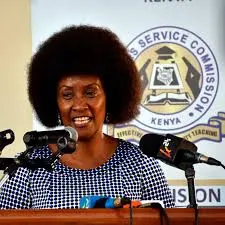The TSC vs. KNUT Showdown: Who Holds the Key to Teacher Recruitment Standards?
As Kenya sets its sights on the ambitious Vision 2030, aiming to emerge as a competitive and thriving nation with a high standard of living, education stands as a cornerstone of this vision. The goal is to transform into a newly-industrialized, middle-income nation that ensures a quality life for all its citizens within a clean and secure environment. Central to this educational endeavor are teachers, whose qualifications and capabilities are vital for nurturing a skilled populace ready to engage in various socio-economic and political arenas, propelling the nation toward its developmental milestones.
The Qualifications Conundrum
Currently, a heated discussion is unfolding between the Kenya National Union of Teachers (KNUT) and the Teachers’ Service Commission (TSC) regarding the criteria for teacher recruitment: should the focus be on the highest academic qualifications or the Kenya Certificate of Secondary Education (KCSE) scores?
KNUT advocates for hiring teachers based on their highest academic achievements, irrespective of their KCSE grades—even if they scored a D, as long as they hold a master’s degree. They argue that this approach could help address the pressing teacher shortage.
Conversely, the TSC mandates that candidates must achieve at least a C plain in KCSE to qualify for a Diploma teaching position.
What do these differing stances mean for the education system? Is it better to prioritize quantity over quality? What should be the absolute minimum standard for hiring teachers without compromising the quality of education and, ultimately, student outcomes?
The Unique Landscape of Teaching in Kenya
In Kenya, teaching is one of the few professions that faces scrutiny based on its outcomes—specifically, student performance—while similar pressures are rarely applied to other fields. Reports frequently surface of teachers and principals being dismissed for underwhelming academic results, yet we seldom hear of doctors or engineers facing similar consequences for poor outcomes, such as patient fatalities or structural failures.
While unfortunate incidents do occur in these professions, the training and preparation of their practitioners are not typically undermined. It’s rare to see the Kenya Medical Practitioners and Dentists Council or the Engineers Board of Kenya suggesting that entry-level grades be overlooked in favor of hiring candidates with advanced qualifications.
If Kenya truly values education as a critical profession on par with medicine or engineering, shouldn’t there be a fundamental minimum standard established from the high school level?
The TSC and KNUT Dynamic
Take Finland, often hailed for its exemplary education system, where teachers are required to possess at least a bachelor’s degree. While Kenya may not yet be at that level, the TSC is making strides toward raising the bar for entry into the teaching profession.
KNUT, as a prominent advocate for teachers, should champion the establishment of systems that ensure a steady influx of qualified educators into the system, starting from Form Four.
With the TSC setting the bar at a C for Diploma teachers, KNUT, in partnership with the Ministry of Education and universities, could propose targeted teacher pipeline programs that guarantee the admission of candidates who meet these standards.
Elevating Teaching as a Career
Additionally, the Ministry of Education can enhance the appeal of teaching at the high school level through initiatives such as internships, mentorship programs, and scholarships for high-achieving students interested in pursuing teaching.
By emphasizing quality from the outset rather than merely increasing numbers, we can shift the perception of the teaching profession in Kenya, granting it the respect and professionalism it deserves.
Moreover, once teachers are hired, they should receive ongoing, high-quality professional development, including mentorship, modern pedagogical techniques, and leadership training to cultivate a new generation of curriculum experts who can guide their peers.
Some of these initiatives are already being implemented by the TSC. However, it’s crucial for KNUT to collaborate with the TSC in creating mechanisms that regularly assess teachers’ readiness to navigate the evolving complexities of the national, regional, and global educational landscape.
While it’s possible to hire teachers with advanced degrees, they may not possess the necessary skills to effectively deliver their content and pedagogical expertise.
If we aim to advance our nation, we must adopt sustainable strategies that align with our long-term vision.
Investing in the quality of our educational workforce—from preparation to ongoing professional development—will position us competitively, enhancing student outcomes and ultimately fulfilling our national development goals.
